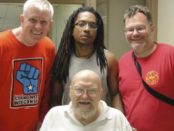Joe Johnson, a fighter for workers and the oppressed
Picture this: You have fallen in your own home and can’t get up. You live alone and the telephone is at one end of a long hall. You are lying at the other end.
Joe Johnson of Chippewa Falls, Wis., a longtime subscriber to Workers World, first came to our editorial board’s attention when he sent us a letter in 2007 describing how he had spent five days — five days! — inching his way along the floor until he could call for help.
It was the thought of Workers World and the struggles of the oppressed everywhere that kept him going, he wrote.
Johnson died on Aug. 5 at the age of 84. He had been living for several years in a modest room at the Wissota Health and Regional Vent Center dealing with serious health problems. It was cancer that finally brought him down. But up to the very last days of his life, this veteran of many struggles exuded revolutionary optimism, energy and courage, signing all his letters “In the spirit of Crazy Horse! We shall win!”
In his many letters to the paper and conversations with comrades from Workers World Party who visited him, Joe exuded a fighting spirit and a broad knowledge of history — especially of the class struggle in the U.S. since the 1930s and the heroic battles of nationally oppressed peoples for freedom and sovereignty.
Joe was born in Chicago in 1930. When still young, he met the leaders of the great Minneapolis general strike of 1934 — revolutionary socialists who had helped build the Teamsters union. In the 1950s he resisted the draft during the U.S. war against People’s Korea and spent time in federal prison for his anti-war stand. He also worked in Canada periodically from the 1950s on. In later years, he promoted progressive knowledge and concepts through bookstores he acquired in the Chippewa Falls area.
Joe Johnson understood the power of the workers when organized and conscious of their goal, and was inspired when labor and youth occupied the State Capitol in Wisconsin trying to stop Gov. Scott Walker’s union-busting drive. But he knew they needed revolutionary communist leadership and organization to sustain that struggle.
WW organizer Bryan G. Pfeifer, who visited Joe about twice a year, recalls that “the first thing he’d do is hand me a stack of bills he had saved in the intervening months since our last visit. Being indigent, he only received on average about $10-$20 a month from the state and also possibly some contributions from friends. Handing me his diligently saved funds, he’d say, ‘Use this for whatever the party needs and build the party.’
“He wanted to immediately discuss the class struggles going on, all with an internationalist focus. He particularly was interested in the youth and students joining WWP and the work of Fight Imperialism, Stand Together (FIST). He was an implacable foe of the repressive bodies of the capitalist-imperialist state such as the police and military.
“He never abandoned the oppressed, consistently insisting on the need for working-class white workers to fight chauvinism and white supremacy and to support formations such as the Black Lives Matter movement.”
This was consistent with Johnson’s earlier support for the Vietnamese national liberation struggle, the Irish liberation struggle, the American Indian Movement, the Black Panthers and many other Black liberation forces, the Brown Berets and the women’s and lesbian-gay-bi-trans-queer liberation movements.
Joe Johnson made his mark on history and will long be remembered with great affection.


